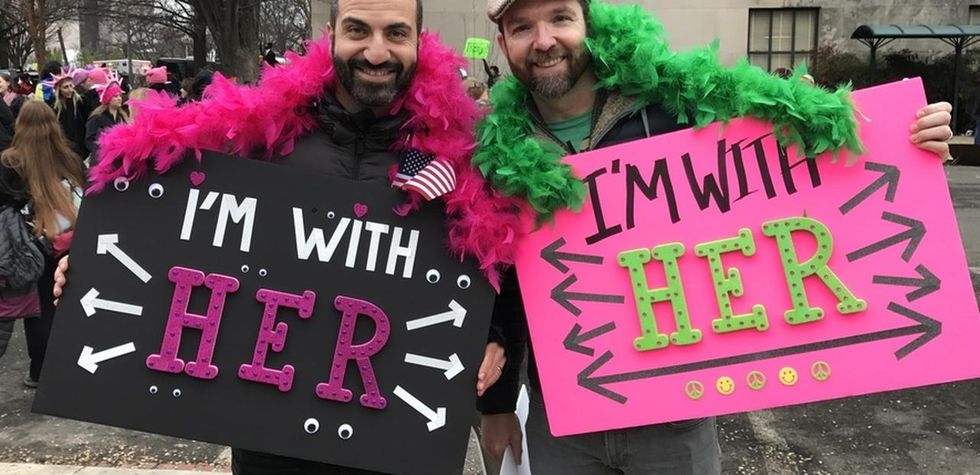It’s often impossible to bring up feminism without somebody replying “What about men’s rights?” It’s annoying, and it’s often used as nothing more than a way to shut down the conversation. Generally speaking, men have more rights than women. This is what we mean by the term “male privilege.” It does not mean that men’s lives are guaranteed to be easier or less painful than women’s, but it does mean they are less likely to deal with certain difficulties that women deal with.
Men do still face certain challenges. Unfortunately, the people who so often say “what about men’s rights?” never actually make any solid attempt to better the lives of men. Here are 10 ways to actually help men, if you truly care.
1. Don’t promote toxic masculinity.
Toxic masculinity refers to the attitude that in order to be masculine, one must be violent, unemotional, and sexually aggressive. It’s common to hear things like “man up” or “boys don’t cry.” But these phrases are extremely damaging to men. They prevent them from expressing their emotions in a healthy way, and instead, they cope with either anger or shutting down. This is not to say that masculinity itself is bad. One can be masculine in a positive and productive way, and we should make an effort to teach this. For example, empathy, tenderness, and kindness can all be considered traits of non-toxic masculinity. By teaching this, men can learn to cope with their emotions better and they can better treat the people in their lives.
2. Donate and volunteer to homeless shelters.
51 percent of individuals experiencing homelessness in the United States are single men. People become homeless for many reasons. Unfortunately, they are usually blamed for this even when the situation is not their fault. Even if it is, it is no reason to treat them with disrespect. There are many ways to help including volunteering at homeless shelters, donating money or clothes, and following local politics to support legislature to help alleviate homelessness.
3. Support male rape victims.
1 in 33 men have experienced rape in their lifetime. Unfortunately, many do not seek any kind of support due to the stigma against male rape victims. Many are made to feel that they wanted it or deserved it because they are men, and therefore should be able to fight back. This is not true.
Anybody can be a victim of rape regardless of gender. Today, male rape is often minimized or turned into a joke. Movies use them for humorous plotlines, or, when it is female-on-male rape, it is suggested that the man should be “grateful.”
Attitudes like these force male victims to hide their trauma which is often extremely detrimental to their health. They may go through their entire lives with untreated PTSD, depression, and guilt and other untreated conditions. If a man in your life comes to you and says that he was raped, listen to him, validate his experience, and help him get the support he needs. If he decides to file a police report, be there for him. You can find more resources here.
4. Advocate for suicide prevention.
Although women attempt suicide three times more than men, men are more likely to die by suicide partly because they often use more lethal means such as firearms. A culture of toxic masculinity is one of the things that can lead men to not seeking out help for their depression.
Another thing that can affect this is how we issue the ongoing stigma. If men do not have access to or knowledge about the help they can get, they are more likely to hurt themselves. While much progress has been made to discuss mental health more openly, many people, including men, still feel afraid of being judged for speaking out, especially if they suffer from psychotic or personality disorders which are still highly stigmatized.
You can help prevent male suicide is to support legislation that prevents individuals with mental illnesses from obtaining firearms. While this will not completely eliminate male suicide, it can make it harder for men to attempt or commit suicide.
5. Support workers rights.
Statistically speaking, men are more likely to die in workplace incidents. Workers everywhere in the United States, especially low-wage workers, are targeted and disadvantaged. Work with your local unions, which often advocate for stronger workplace regulations, and vote for candidates who support stronger workers' rights to advocate for workers' rights. By supporting workers’ rights, you are helping men work in safer and sanitary conditions, lessening their chance of death at work.
6. Teach consent at a young age.
In the United States, sexual education (sex ed) is still considered taboo. Often, it is left up to individual school districts to decide what is taught. In some states, parents can have their children taken out of sex ed classes. Sex ed generally starts in junior high or high school with some classes that do not talk about consent at all. This is extremely harmful. Some men may not learn anything about consent until they reach college. By then, it is often too late for them to change their opinions on sex.
Meanwhile, in the Netherlands, sex education starts in kindergarten. Not only do they talk about sexuality, intercourse, and contraceptives, but they also teach consent. Not only does this lessen the risk of boys growing up with toxic ideas of sex, but it also protects themselves from sexual assault. If we want to drastically lessen rape and abuse, we need to start by teaching children at an early age. Otherwise, we will only be able punish these crimes after they’ve happened, rather than preventing them. By equipping men with knowledge of consent at an early age, we are enabling them to make healthy and thoughtful decisions about sex.
7. Support prison reform and re-entry programs.
The United States has the highest incarceration rate in the world. African-American men are over-represented in prison despite the fact that they make up a smaller percentage of the US population than white men. Men generally receive longer prison sentences than women, although women of color are more likely to receive longer time for the same crimes as white women.
When prisoners are released, they are often faced with many difficulties. They may be discriminated against in job applications. They are only able to work low-wage jobs. They cannot vote, and they are not eligible for public housing or government assistance. Because of this, they are more likely to re-offend. To support ex-convicts in their efforts to re-enter society, you can find a list here of reentry programs by state.
We must also de-stigmatize incarceration. While some crimes, such as murder or rape, should be heavily punished, other crimes may not warrant the same punishment. All crime is bad, but depending on the crime, and if the individual makes an effort to redeem themselves and live honestly, there is no reason they should not be given the opportunity to live comfortably and without judgment.
8. Help overturn wrongful convictions.
Men’s rights activists talk a lot about the supposed “epidemic” of false rape accusations. In reality, the FBI estimates that two to eight percent of rape accusations are false and that most rapes in the United States go unreported.
However, if you are truly concerned with men being wrongfully imprisoned, you can support groups like the Innocence Project. The Innocence Project is a large network of legal experts and advocates that examine possible cases of wrongful convictions and works to get them overturned. In one study published in the Proceedings of the National Academy of Sciences, it was found that 1 in 25 defendants who are sentenced to death in the United States are later proven innocent. Poverty is also a reason innocent people may plead guilty. If they cannot afford bail or a good lawyer, they may plead guilty to prevent a worse conviction.
9. Don't center the conversation around white, cis, straight men.
This is not to say that the opinions or lives of these men are not important. Unfortunately, conversations are often centered in about men’s issues, particularly those who are white, cis, and straight. There are men of color, men of differing sexual orientations, trans men, disabled men, men experiencing poverty, and they all matter too! When discussing these issues, it is important to remember that some men may be more affected than others.
10. Do not support the men's rights movement.
Recently, the Southern Poverty Law Center (SPLC) declared the men’s rights movement a hate group. According to SPLC, the men’s rights movement is not actually about helping men but promoting male supremacy. The men’s rights movement does not focus on any men but white, cis, straight men.
They also spread false claims about women such as that women lie about rape or abuse on a regular basis in order to gain sympathy or money. Many are also known to harass women on social media, and some have even organized targeted harassment campaigns against prominent women on the internet, such as Anita Sarkeesian, the creator of the YouTube channel Feminist Frequency.
Many prominent male rights “activists” have been shown to have racist views as well, and many consider the men’s rights movement a gateway to the “alt-right” Neo-Nazi movement. This is not a movement that truly cares about the well-being of men. It is a hate movement, and it is incredibly dangerous. It teaches men that in order to be “real” men, they must be violent, domineering, and their entire worth relies on how much sex they have. Men deserve better than a hate group whose only real goal is to demean and intimidate women.
While men still face many challenges, we never make a solid attempt to better their lives. When you ask "what about men's rights?", ask yourself "what can I do to help?" if you truly care.



















